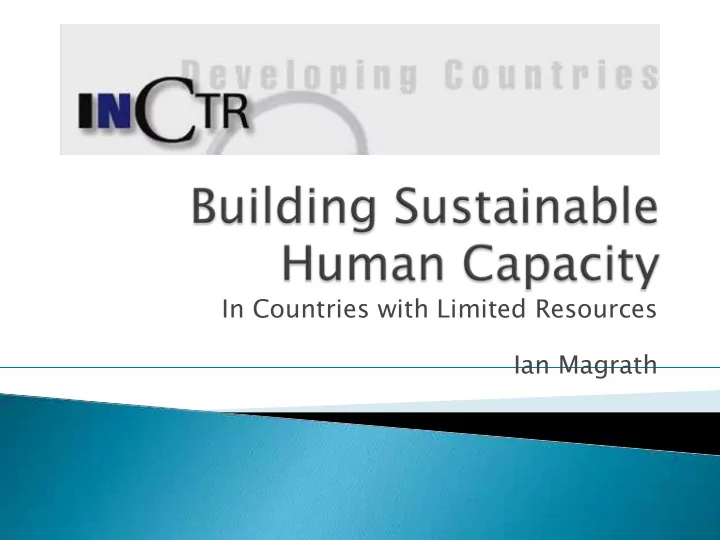

In Countries with Limited Resources Ian Magrath
◦ (9) to to ensure access to to appropriate te informati tion in relation to preventive, diagnostic and treatment procedures and options, especially by cancer patients, and to palliative care; ◦ (10) to to develop appropriate te informati tion syste tems, including outcome and process indicators that support planning, monitoring and evaluation of cancer- prevention, control and palliative care programmes; ◦ (17) to to develop and str trength then health th syste tem infrastr tructu ture, particularly related to human resources for health, in order to to build adequate te capacity ty for effecti tive implementa tati tion of cancer preventi tion and contr trol prog program rammes es, including a cancer registr try syste tem;
! (7) to promote research research on cost-effectiveness of different strategies for prevention and management of various cancers; ! (8) to promote and support research research that evaluates low-cost interventions that are affordable and sustainable in low-income countries; ! (9) to promote research research on development of an effective vaccine against cervical cancer; ! (10) to to support t th the furth ther development t and expansion expan sion of a research of a research ag agen enda da in IARC and other bodies that is appropriate to the framing of integrated policies and strategies for cancer control, and to promote te and support t te technical and medical prog program rammes es in cancer tr treatm tment;
! Governments? Universities? Professional societies? Latter may not exist or have a limited role in determining policy, universities often few ! Some African countries have no medical schools, or very few, and others may not support specialist training in disciplines relevant to cancer control ! Academic health organizations (Royal Colleges as in UK, Academies as in USA) do not generally exist in L and MI countries but, being more practically oriented oriented and require practical skills and on-the-job training ! Capacity ty building should be a component t of th the nati tional cancer contr trol programs and addressed by a mix of people afte ter assessing needs.
! Too few children are educated to secondary level to be able to enter an institute of higher education for a degree course – deficit in teachers too ! Too few institutes of higher education ! Lack of uniformity in requirements for training/ credentialing health professionals ! No continuing medical education – out of date ! Potential for loss of trainees to the private “for- profit” sector (which provides care for only a small fraction of people) or abroad ! Limited organization at country level ! Limited funding available for higher education
! “Narrow” tr training underta taken for parti ticular elements ts of th the cancer contr trol plan, e.g., breast clinical examination, cervical cancer screening ? ◦ Can rapidly establish capacity for a single program (e.g., screening, vaccination, tobacco control, etc.?} ◦ When resources are minimal, if health professionals trained for these tasks, could detract from other duties ! University ty degree courses in oncology or relate ted dis disciplin ciplines es may not exist – how can they be created when there is a paucity of in-country experts? ◦ Take years to train people. Courses adapted wholesale from elsewhere, especially from high income countries, may not be suitable or feasible in developing countries.
External/ Local Focu Focused Worksh sed Workshops ops – Cooperati tive Groups– Experts i.e., with a small i.e., an association of number of specific hospitals that themes, attended by develop approaches Assessment local and external to the control of of current experts and specific diseases situation re: associated with visits (e.g., gynecological health care to facilities/Gov cancers, oral cancers) and human resources Virtual courses on- Experts create line that when educational combined with elements leading practicals, lead to to certification certification Sufficient Certificates constitute a degree or diploma
! Estimate resources required, human and otherwise, in different geographic regions ! Provide incentives for health professionals to work in more remote areas, to improve referral patterns and develop programs that emphasize “on-the-job-training” ! Decide mix of project-related training and arbitrarily expanding health care providers at all levels ! Take advantage of open resources for e- learning
! Develop Open Access Repository of information relevant to all aspects of cancer ! Develop central repository of core curricula for all types of health care providers (OERC) as well as course material that can provide on-line learning and has the imprimatur of relevant organizations ! Hold meetings and workshops relevant to developing and approving the above resources ! Develop a system of stepwise certification (training modules that lead to certification) that is accepted internationally, but modified locally to the extent required.
! A Consortium of organizations dedicated to building an open digital library which provides access to a wide range of cancer educational materials with special emphasis on developing countries ! There are plans to incorporate curricula and eventually course material for various oncology specialties ! Members include: ◦ INCTR, MERLOT, AcrossWorld, DFK Consulting, Indo- American Cancer Association
Recommend
More recommend